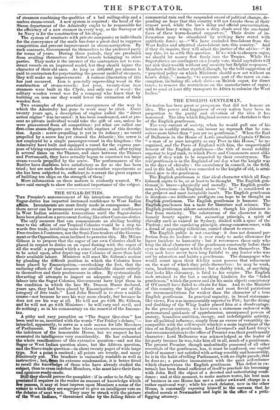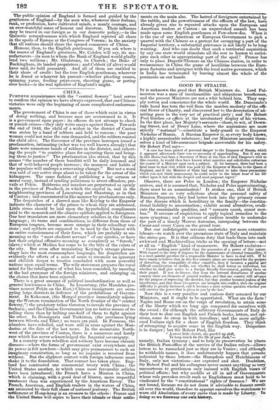THE ENGLISH GENTLEMAN.
No nation has been great or prosperous that did not honour an idea. The power and happiness of every nation have been in proportion to the purity and elevation of the idea it has honoured. The idea which England reveres and -cherishes is that of the English gentleman. The very outcast of society, when he would gall one of his betters in worldly station, can invent no reproach that he con- ceives more bitter than "you are no gentleman." When the Earl of Dalhousie in the House of Lords proclaimedCaptain O'Brien "a man of as pure integrity as any Peer in this House," be re- cognized, and the Peers of England with him,, the unquestioned honour of the English gentleman—the title of moral nobility superior to legal rank, to which Peers and Commoners must alike aspire if they wish to be respected by their countrymen. The real gentleman is in the England of our day what the knight was in the days of chivalry : the ascendancy in council, in the field, and in the hall, which was conceded to the knight of old, is attri- buted now to the gentleman.
The nglish gentleman is that ideal character which all Eng- lishma aspire to be, or at least to be thought. The English gen- tlernaqis brave—physically and morally. The English gentle- man isiveracious—m England alone "the lie" is considered as the greyest and most inexpiable insult. The English gentleman is dedosous—no deliberate profligate can hope to be thought an Englisli gentleman. The English. gentleman is humane. The English gentleman has a taste • for literature and science. The English gentleman abhors ostentation ; though his plainness is free from rusticity. The substratum of the character is the homely- hearty squireS the animating principle, a spirit of chivalry such as existed in Sydney, dashed with a spice of the Puritan ; and the regulating principle, strong common sense, with a dread of appearing ridiculous, carried almost to excess.
The English public is not exacting : it does not demand per- fection from its leaders—it is ever ready to make allowance for lapses incident to humanity : but it reverences those only who keep the ideal character of the gentleman constantly before their eyes as the model upon which they seek to form themselves. The very mob have never been long faithful to any leader who was not by education and habits a gentleman. The demagogue who would count upon their fidelity must possess that refinement on the want of which they pride themselves : he may be weak, vain headstrong, inconsistent ; but a shabby trick, or anything
that like chicanery, is fatal to his empire. The English mob retained to the last a sneaking kindness for the "faded gentleman," which the power and (in his main object) consistency of O'Connell have failed to obtain for him. And to the Minister of this country the highest talents and most fervid patriotism are recommendations far weaker than the character of a true English gentleman. In practical sagacity, in broad statesman- like views, Fox was immeasurably superior to Pitt ; but the dicing and drabbing of the Whig leader placed him at a disadvantage. In the present century, we have seen a statesman endowed with preternatural quickness of apprehension, unsurpassed powers of oratory, boundless ambition, energy, and indefatigable activity, lose all political influence, simply from an excess of versatility in- compatible with the self-respect which is a main ingredient of the idea of an English gentleman. Lord Liverpool's and Lord Grey's best reconamendation to the office of Premier was their gentlemanly character : Lord Melbourne was acknowledged as the leader of his party because he was, take him all in all, much of a gentleman. The present Premier, though undoubtedly possessed of all other essentials of the gentleman, has, it must be confessed, one capital fault of manner: not satisfied with acting sensibly and honourably-, he is in the habit of telling Parliament, with no slight parade, that he does so ; a practice inconsistent with the quiet self-reliance which characterizes the English gentleman. This defect in ex- ternals has been found sufficient of itself to preclude his becoming with John Bull the object of a devoted and unhesitating confi- dence: and at this moment, to make matters worse, his best man of business in one House has met a rather awkward charge in a rather equivocal way; while his crack debater, now in the other House, is constantly exposing himself :to the sarcasm that, he studied morals at Newmarket and logic in the office of a petti- fogging attorney..
The public opinion of England is formed and guided by the
gentlemen of land—by the men who, whatever their fortune, rank, or profession, have cultivated minds, a manly courage, and an. over-watchful sense of honour and decorum. Their influence may be traced in our foreign as in our domestic policy,—in the Quixotic scrupulousness with which England rejected all share in the spoils of Europe at the Congress of Verona; in the anxiety that all nations should share the opened commerce of China. Honour, then, to the English gentleman. If you ask where is the source of England's greatness' Mr. Cobden will say, its ma- nufacturers—its men to whom the Bank of England would gladly lend two millions ; Mr. Gladstone, its Church ; the Duke of Buckingham, its landed proprietors,- and Cobbett (if alive) would have said, its bold peasantry. And all of them are entitled to their share of credit : but the true English gentleman, wherever .he is found or whatever his pursuit—whether pleading causes, spinning yarns feeding prize-oxen, shooting game, or poring aver books—is the real upholder of England's might.



























 Previous page
Previous page